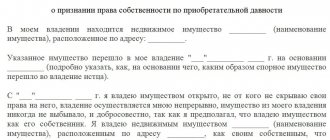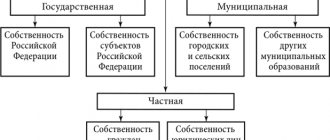Conditions of acquisitive prescription
It is obvious that by taking possession of property by unlawful means, such as, for example, concealing documents or seizing space, contrary to the will of the legal owner, the possibility of applying acquisitive prescription is excluded. But if you owned real estate in good faith, for example an apartment, that is, you did not hide the fact that you lived in it, allowed guests in, paid bills on your own behalf, carried out current and major repairs - then there is a way out, and this is the possibility of obtaining rights through the rules on acquisitive prescription.
- statute of limitations for acquisitive limitation: you must use the real estate so that there are no interruptions in residence for fifteen consecutive years;
- live not on the basis of a lease agreement (click on the link you can get acquainted with an advantageous offer for drawing up any agreement on our part) or other agreement with the owner, do not hide from anyone that your use is not backed by written documents giving you the right to housing ;
- own the apartment in good faith, that is, not know that there is no basis for the emergence of your ownership rights.
Advantages of registration in the order of acquisitive prescription
- inner peace and confidence in the future arises, there is no fear of losing what money is invested in (current repairs, redevelopment, improvements);
- property rights registered on the basis of a court decision with the registration authority provide prospects for improving living conditions because it becomes possible to sell the property and make a down payment on a mortgage loan;
- a legal right to rent out the object arises, because now continuity of ownership, as well as proof of openness of use, is no longer required. Receiving income from rental property can be considered as an additional incentive when deciding whether or not to register real estate through the process of acquisitive prescription for property.
Acquisitive prescription for property through court
A statement of claim to the court for recognition of rights to property due to prescription is a good opportunity to become the rightful owner of the occupied objects.
How to file a claim in court for acquisitive prescription?
In accordance with paragraphs 2-3 of paragraph 19 of the Resolution of the Plenum of the Supreme Arbitration Court No. 10, the specified statement of claim is presented to the former owner of the property. If the plaintiff does not know such a person, then the state registrar is involved as a defendant (interested person).
The rules for drawing up an application are no different from the general rules established by procedural legislation.
According to the text of the application, you must indicate the name of the location of the property, describe the evidence confirming that you in good faith own this property “as if it were your own” (clause 1 of Article 234 of the Civil Code of the Russian Federation).
In the pleading part, indicate - I ask you to recognize the Plaintiff’s ownership of such and such a thing due to acquisitive prescription.
What documents can be presented to the judge for acquisitive prescription?
- A copy of the technical passport;
- Documents proving that you have continuously and in good faith owned the property for a certain period of time (more than 5 or 15 years).
- A document confirming the sending or delivery of a copy of the claim (and its attachments) to the defendant or other involved persons;
- Receipt for payment of state duty;
- The Law Office “Katsailidi and Partners” will explain to you about other documents (depending on your legal status).
The procedure for registering ownership of an apartment by acquisitive prescription
Considering that cases of calling up ownership rights to an apartment due to acquisitive prescription are considered only in court, the procedure for exercising the rights of the owner should be carried out in the following order:
- Preparation of necessary documents and evidence.
- Filing a claim.
- Payment of state duty.
- Submitting an application and documents to the court.
- Participation in court hearings.
- Obtaining a court decision.
- Registration of property rights when a decision is made in favor of the plaintiff.
Before deciding to start a lawsuit, we recommend making sure that there are no claims to the property from other persons who have legal grounds (for example, the heirs of the owner).
Preparation of documents for going to court
The applicant for property must attach the following documents to the statement of claim:
- passport;
- existing documents for the apartment;
- any papers confirming the 15-year period of use of the property;
- calculations of the cost of the claim, a certificate of cadastral value of the apartment, technical plan of the residential premises;
- receipt of payment of duty.
These are just the basic documents. The exact list of documents can only be determined based on each specific situation.
What is evidence of acquisitive prescription?
The burden of proving that all requirements for the application of acquisitive prescription have been met lies with the plaintiff.
He may provide the court with the following evidence of his right:
- documents confirming receipt and payment of utilities by the actual owner;
- contract for the protection of the property concluded by the applicant;
- documents confirming that the owner has carried out repair work at his own expense;
- witness statements;
- agreement on the transfer of apartments for rent to other persons on behalf of the actual owner;
- other evidence relevant to the case.
The evidentiary procedure is the most difficult stage in such cases, so it is worth involving an experienced lawyer in the case.
Drawing up a statement of claim
When the subject of the claim in cases of acquisitive prescription is an apartment or house, the application can be addressed to the owner of the property. If there is no information about the owner or he is not known to the actual owner, then he has the right to submit an application to the court to establish the fact of ownership of the property during the period of acquisitive limitation. In this case, the registrar of Rosreestr is involved in the case by a third party (Resolution of the Plenum of the Armed Forces of the Russian Federation dated April 29, 2010 No. 22).
If the actual owner lays claim to property that is not accepted by the heirs and is considered escheated, then the municipal administration may be brought in as a defendant.
In addition to the general requirements for drawing up an application, provided for in Article 131 of the Code of Civil Procedure of the Russian Federation, a statement of claim for recognition of ownership rights due to acquisitive prescription must contain the following information:
- information about the beginning of the period of ownership of property of which the citizen is not the owner;
- an indication of bona fide, continuous and open ownership of the residential premises and how these conditions are confirmed;
- describe the circumstances of receiving the property into possession;
- if the property was received by succession, then it is necessary to refer to evidence of this fact;
- all information known to the applicant about the property.
The successful outcome of the case depends on a competent presentation of the circumstances of the case and their documentary substantiation, so the preparation of the statement of claim must be approached seriously.
Payment of state duty
Applications for recognition of property rights in connection with acquisitive prescription relate to claims of a property nature, therefore, when paying the state duty, the rules provided for in Article 333.19 of the Tax Code of the Russian Federation apply to them.
For each case, the fee will be calculated based on the value of the property claimed by the applicant, which is determined based on the cadastral value of the property, its inventory value or the assessment of the property.
Thus, the calculation of the state duty will be as follows depending on the cost of the claim:
- up to 20 thousand rubles. – 4% of the cost of the object, but not less than 400 rubles;
- from 20 thousand rubles. up to 100 thousand rubles. – 800 rub. + 3% of the amount over 20 thousand rubles;
- from 100 thousand rubles. up to 200 thousand rubles. – 3200 rub. + 2% of the amount over 100 thousand rubles;
- from 200 thousand rubles. up to 1 million rubles – 5200 rub. + 1% of the amount exceeding 200 thousand rubles;
- from 1 million rub. – 13200 rub. + 0.5% of the amount over 1 million rubles, but not more than 60 thousand rubles.
Payment of the state duty can be made at any bank branch or terminal using the available court details. Details can be found on the website of the court to which the application is sent.
Going to court
After collecting documents and preparing a claim, the citizen sends the documents in any way convenient for him - by mail, in person or through a representative by proxy. In accordance with Part 1 of Art. 30 of the Code of Civil Procedure of the Russian Federation, claims for rights to real estate are sent to the district court at the location of the disputed property (if the plaintiff is an individual).
During the consideration of the case, the applicant for the property may file a petition to call witnesses, since often in such cases only witness testimony can confirm the integrity of the actual owner and his compliance with the conditions of acquisitive limitation.
Obtaining a court decision
A court decision that has entered into legal force, by which the fact of ownership of the property as one’s own is confirmed, gives the applicant grounds to apply to the registration authority to register ownership of the property (Article 268 of the Code of Civil Procedure of the Russian Federation).
Refusal of acquisitive prescription
First of all, don’t despair. Perhaps you have not reached the acquisitive statute of limitations, not all documents confirming your right to the property have been attached, or the petition part of the application has not been drawn up correctly. There may be a lot of nuances in this matter, but it is quite difficult to understand these legal subtleties without the appropriate education and experience, if not, it is impossible. Therefore, if your claim is denied, contact us; you need the help of a professional!
Continuity of ownership and its characteristics
Continuity of possession of an object in respect of which a claim is filed for recognition of ownership rights to it is interpreted literally by the judicial authorities. The tenure period established by clause 1 of Art. 234 of the Civil Code of the Russian Federation, should not be terminated or interrupted (paragraph 5, clause 15 of resolution No. 10/22).
To establish the fact of continuity, documents must be submitted to the court for the entire period of ownership that will confirm this. Eg:
This is important to know: Object and subject of property: differentiation
- contracts with public utilities;
- tax payment receipts;
- payment documents indicating constant payments for the maintenance of housing and its operation;
- other documents from the contents of which it can be determined that the plaintiff owned the property for the required period.
Risks! If during the ownership of property there are periods when a citizen or organization could not use and exercise ownership of the property due to any circumstances, then the claim may be denied. Moreover, a plaintiff's assertion of continuity of ownership may be questioned if there is no documentation of ownership during certain periods (for example, lack of utility payments).
Note! Continuity is not violated if the owner transferred the disputed property for temporary possession to third parties, for example, for rent (clause 15 of resolution No. 10/22).
Judicial practice on acquisitive prescription
A case from our legal practice that ended in a win in favor of the plaintiff:
V.’s family consisting of I.V. and S.V. in 1994, an apartment was given to them by a trust, but they were not given any documents when entering this apartment. Later, the residents were registered at their place of residence. Currently, two children live with them. From the moment they moved into the apartment, the family paid bills for heat and electricity. She independently bore the costs of maintaining the house. During this entire period, the owner of the residential premises did not make any claims regarding the apartment. Since the family openly, conscientiously and continuously owned the apartment for 15 years, they wanted their ownership rights to this property to be recognized, since they have such a right. No one has ever attempted to challenge their rights to this apartment. V.’s family had no other housing, and there was no possibility of purchasing it.
Based on the provisions of the Constitution of the Russian Federation and the norms on acquisitive prescription, the court made a decision to recognize the V. family’s ownership of this apartment, which allowed them to register the right to property in the Office of the Federal Registration Service for the Sverdlovsk Region. So, with our help, the family was able to become the full owner of their home, and you also have this opportunity by solving the problem of acquisitive prescription for property.
Is it possible to recognize ownership by acquisitive prescription of a share in an apartment?
There is no direct indication in the legislation of the possibility or impossibility of recognizing ownership of a share in an apartment.
At the same time, judicial practice on this issue is also ambiguous. The right of an applicant to a share in real estate due to acquisitive prescription is considered by the court individually, depending on the circumstances of the case, and even similar circumstances are interpreted by the courts differently. Thus, in 2021, the Khabarovsk Regional Court rejected citizen L.’s claim in the administration of the municipality to recognize her rights to a ½ share in a one-room apartment due to acquisitive prescription. The plaintiff accepted half of the apartment by inheritance; the second half was not accepted by anyone after the death of the owner. For 16 years, citizen L. owned the entire apartment as her own.
In rejecting the claims, the court referred to the fact that citizen L. did not own the share in good faith, since she knew that she had no rights to this property.
However, the Supreme Court overturned the decision and sent the case for a new trial, having established that the share of the deceased is escheated property and, according to the law, the municipality is considered its owner, but the inheritance was not formalized and actual ownership of the apartment was not exercised.
The Supreme Court also noted that the right of ownership can be recognized not only for ownerless property, but also for that which belongs to another person. Therefore, the fact that the share belongs to a municipal entity is not an obstacle to the application of the provisions of Article 234 of the Civil Code of the Russian Federation and cannot indicate that the plaintiff owned the residential premises in bad faith.
However, in another similar case, the court of the Volgograd region refused to satisfy the plaintiff’s appeal, believing that the escheated share in the residential premises was not ownerless and belonged to the municipality, even though it was not properly registered and was not used by the owner.
In addition, in judicial practice there are cases of recognition of ownership rights to a share owned by an individual, but who does not take any measures for its use and ownership, for the remaining owners of a residential building (court decision of the city of Chistopol, Republic of Tatarstan dated February 28, 2020).
It is impossible to come to an unambiguous conclusion whether it is possible or impossible to recognize ownership of a share in a residential premises. The outcome of the case will depend entirely on its circumstances and the court's position on this issue.








